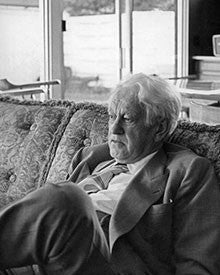
(1903 - 1978)
Nicolas Nabokov was born into Russian gentry, enjoyed a privileged life and showed a strong interest in music from the age of 11. He received his first formal instruction in music composition from Vladimir Rebikov in 1918, when his family moved to escape the Bolshevik revolution. His family left Russia in 1919 and he continued his studies in Stuttgart and Berlin. In 1928, he wrote his first major work, a ballet-oratorio called ODE for Diaghilev’s Ballet Russes de Monte Carlo. Two years later, at the invitation of the Barnes Foundation, he moved to the United States to lecture on western music. Nabokov taught at many universities across the U.S. while continuing to compose. In 1952, he became the Secretary General of the Congress for Cultural Freedom (CCF) and became internationally known for planning international conferences on politics, science, and the arts. During his tenure at the CCF, Nabokov was commissioned by the New York City Ballet to compose the music for their production of Don Quixote. After the CCF disbanded in 1967, he continued to teach at more universities across the United States.
Nicolas Nabokov Composition Timpani and Percussion Requirements
Collectionneur d'echos
No Timpani + 1 percussion
Suspended cymbal, orchestral bass drum, tambourine
__________________________________________________________________________________
Job
Timpani + 3 percussion
Tubaphone, 2 cymbals, suspended cymbal, tam tam, orchestral bass drum, snare drum, tambourine, tenor drum
__________________________________________________________________________________
La Vie de Polichinelle - Les Danses de Polichinelle
Timpani + 4 percussion
Xylophone, clash cymbals, suspended cymbal, tam tam, triangle, castanets, claves, orchestral bass drum, snare drum, tabour, tambourine, tambour sur le bord, tambour militaire
__________________________________________________________________________________
Ode: Meditation sur la majeste de Dieu
Timpani + 3 percussion
Xylophone, clash cymbals, tam tam, orchestral bass drum, snare drum, tabour, tambourine, tenor drum
__________________________________________________________________________________
